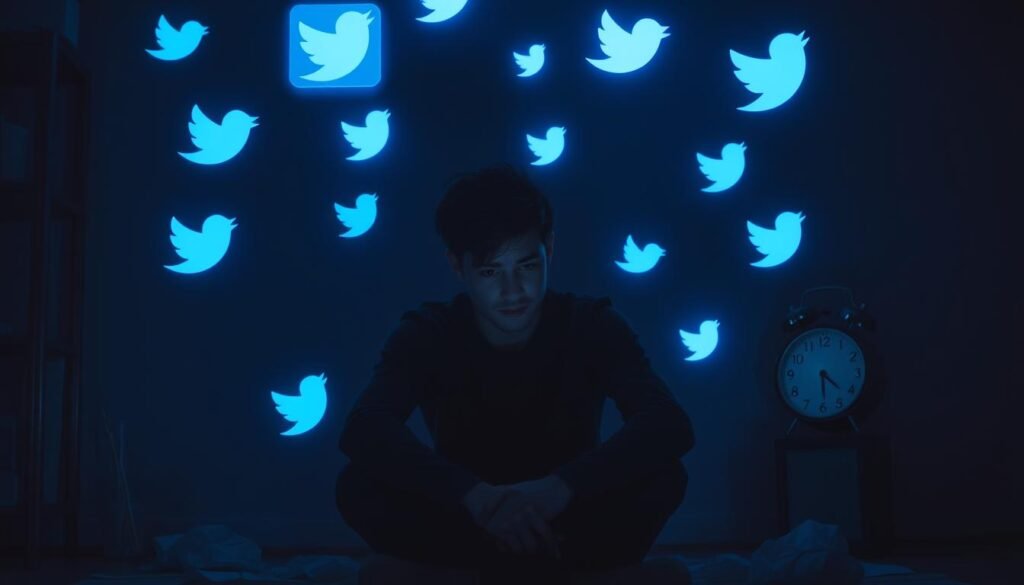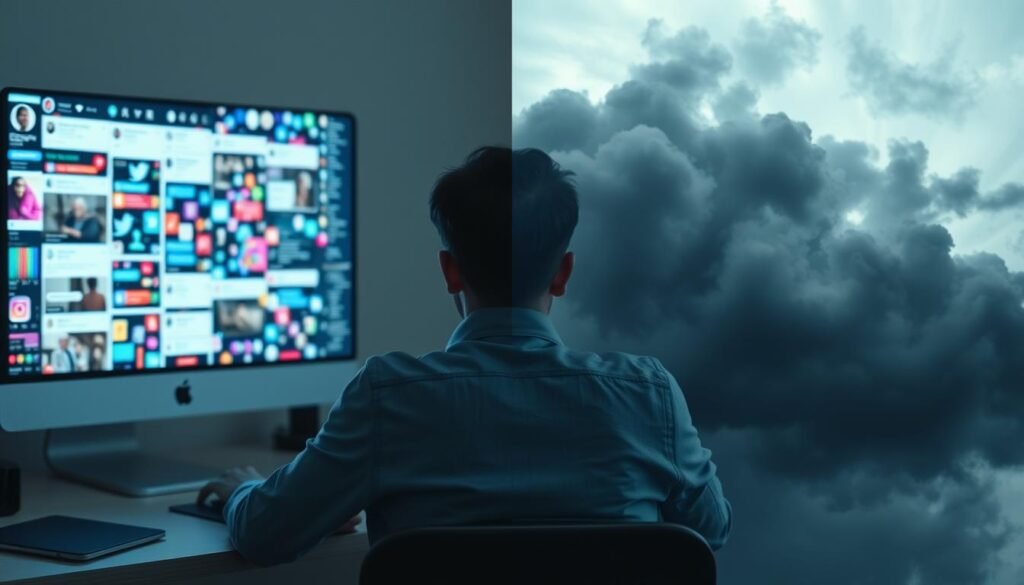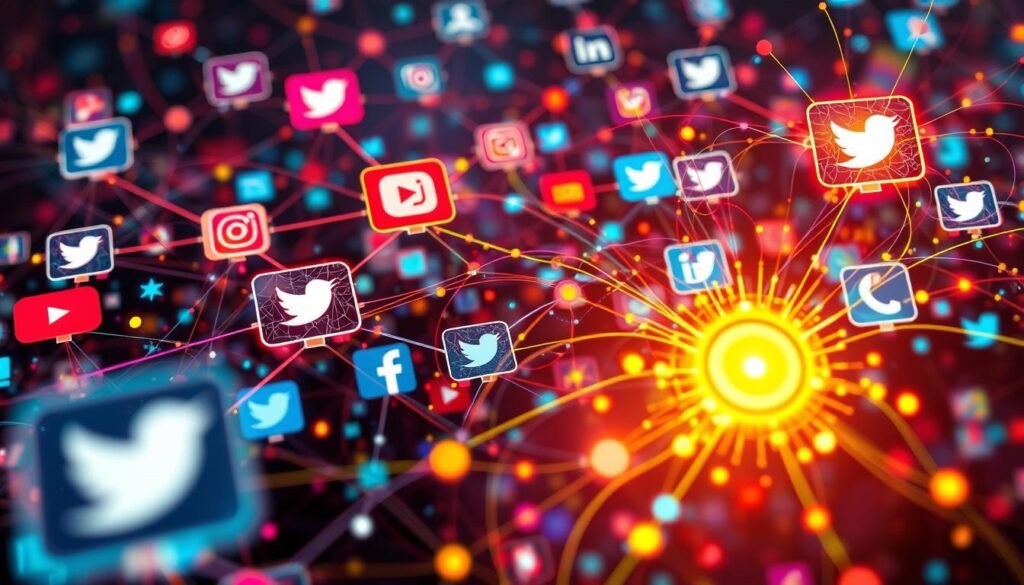Did you know that nearly 20% of social media users can’t go more than three hours without checking their accounts? This shows that social media anxiety is growing fast. As sites like Facebook and Instagram become must-haves, many folks feel stuck in online worries. This often leads to feeling not good enough, lonely, and even depressed. With about 30% of students online for over 15 hours a week, worry about screen addiction is rising.
This article talks about social media anxiety, its signs, and how it affects mental health. We will also look at ways to deal with this in our digital lives. Understanding and handling social media anxiety is key to feeling better and using the internet in a healthier way.
Key Takeaways
- Social media anxiety is a fast-growing problem.
- Close to 20% of users feel they must check social media often.
- Too much online time can harm both body and mind.
- Feeling not good enough and FOMO are common feelings.
- Limiting social media use and taking breaks can help with anxiety.
Understanding Social Media Anxiety
Social media anxiety comes from worry and fear about online interactions and shared content. It’s growing among young people. Studies show a link between lots of social media time and mental health problems. These include internet anxiety and online stress.
Definition of Social Media Anxiety
This anxiety means stress from online presence pressures, peer interactions, and fear of missing out. Always being connected makes this worse. People compare themselves with others online. This can make them feel not good enough and more anxious.
Prevalence Among Different Age Groups
Adolescents and young adults often feel this anxiety. About 20% might have anxiety disorders from social media. They face troubles with digital interactions. In four years, heavy social media users see more anxiety and depression. Yet, educational screen time isn’t as harmful as social media.
So, it’s vital for parents to watch and control their kids’ social media use. For more on social media and mental health, look at this resource.
Signs and Symptoms of Social Media Anxiety
Understanding the signs and symptoms of social media anxiety is key. It shows through emotional indicators and behavioral indicators. These affect daily life and how we interact with others. FOMO, or Fear of Missing Out, makes things worse for many.
Emotional Indicators
Feeling not good enough is a common sign of social media anxiety. This happens when we compare ourselves to others online. It makes people stressed and worried. This fear makes us feel unhappy and lonely.
Behavioral Indicators
Behavior signs include always checking for new messages online. People might ignore real-life friends and not want to go out. This habit causes stress and makes life harder. It gets tough to balance online and offline life.
The Role of FOMO (Fear of Missing Out)
FOMO really affects social media anxiety. It makes people want to always know what friends are doing. This leads to using social media too much. It can make us feel more stressed and unhappy. Knowing about FOMO helps us manage how we use social media.

Impact of Social Media on Mental Health
Social media does more than just keep us connected. It deeply affects our mental health. Many find that these platforms make them feel alone, despite being made to bring us closer. Research shows that using social media a lot can make people feel lonelier.
Connection vs. Isolation
Even though social media promises to connect us, many end up feeling isolated. A study from the University of Pennsylvania found a link between using Facebook, Snapchat, and Instagram a lot and feeling lonely. This shows that having many online friends doesn’t mean our relationships are deep or fulfilling.
Effects on Self-Esteem and Body Image
Social media often shows life and bodies in unrealistic ways. This can hurt how teens see themselves. A 2015 study by Amanda Lenhart for Pew found that teens feel pressure to post perfect pictures. This can lead to anxiety from social media. Seeing others’ perfect lives online can make them unhappy with their own.
Link to Anxiety and Depression
Heavy social media use is linked to more anxiety and depression. Teens using it too much often feel sad or frustrated. A striking fact is that 48% of teens on screens for five hours or more a day show signs of suicide risk. Negative experiences or cyberbullying online can make these feelings worse.

How Social Media Algorithms Affect User Experience
Social media algorithms play a big role in what we see online. They pick out posts that make us feel strong emotions to keep us engaged. This can lead to stress and anxiety for many. People often get stuck seeing the same kind of content, even if it’s not what they’re really interested in. This makes them use social media even more.
Understanding Algorithm Dynamics
Social media sites use algorithms to show us personalized posts. This can make us 50% more engaged. But, it also traps us in “filter bubbles.” We end up mostly seeing posts that echo our own views. About 70% of what we see agrees with our opinions. This doesn’t let us see different perspectives.
The Role of Engagement-Centric Content
Nowadays, content that gets a lot of likes and comments is shown more. This makes us more likely to see extreme or polarizing posts. Reports say such interactions have gone up by 30%. While some enjoy this, others feel worse about themselves. In fact, 60% of people say comparing themselves to others online hurts their self-esteem.

| Impact of Social Media Algorithms | Statistic |
|---|---|
| Increase in user engagement via personalized feeds | Up to 50% |
| Frequency of users exposed to similar content | Up to 70% |
| Users reporting feelings of inadequacy | 60% |
| Increase in addictive behaviors | 40% |
| Increase in interactions with extreme content | 30% |
Becoming aware of how these algorithms work can help us control our online use. By knowing their impact, we can have healthier online habits. We can try for a balance that lessens stress and anxiety from social media.
Effective Strategies to Cope with Social Media Anxiety
To deal with social media anxiety, try different strategies. These methods help you enjoy tech without stress. Taking charge of what you see online reduces bad feelings. By doing this, you make your digital world happier and healthier.
Taking Control of Your Feed
Make your social media feed yours. Choose who you follow carefully. Pick accounts that make you feel good and help you worry less. It’s smart to stop following those who make you feel bad. This way, you lower screen time and boost your mental health.
Practicing Digital Detox
Digital detoxes are key to feeling better about social media. They let you pause and enjoy life offline. This break helps you find fun activities and relationships away from screens. A detox offers you a clear mind and a calm heart in our tech-filled world.
Setting Time Limits for Usage
Setting screen time limits is smart. It helps you balance online and offline life. Less screen time means less anxiety, research says. Boundaries make you think more about your tech use. They help you have a healthier tech life and improve overall happiness.
The Importance of Real-World Interactions
Interacting in the real world is key to overcoming social media anxiety for college students. Face-to-face talks are great for making friends, building emotional strength, and finding support. Focusing on meeting people in person can fight off loneliness and improve emotional health.
Building Genuine Connections
Bonding through in-person interactions creates a tight-knit community feel. Getting involved in things like community events or clubs offers a chance to meet others without too much pressure. This approach reduces feelings of being alone and boosts overall happiness.
Replacing time spent on social media with real conversation and activities can lower social anxiety. When we talk and share experiences directly, we feel more connected and less anxious about online chats.
Activities to Engage Beyond Screens
There are fun ways to interact without always staring at screens, such as:
- Joining sports teams or fitness classes
- Participating in local volunteer opportunities
- Attending book clubs or art workshops
- Engaging in community events or festivals
- Creating study groups or discussion forums
These options are great for forming real friendships. Active engagement in these settings not only fosters connections but improves how we talk to each other. For more on social media and social anxiety, check out this research article.
It’s key to balance online and real-life interactions to feel less isolated. Being active in the community can help ease social anxiety, leading to a happier mind.
Digital Overload and Its Consequences
In today’s world, we often face challenges with social media use. Digital overload leads to stress and anxiety. It’s important to understand these effects to better manage our tech use.
Identifying Digital Burnout
Digital overload can lead to burnout. Signs include irritability, fatigue, and losing interest in things once enjoyed. A 2020 Pew Research Center survey found that over half of U.S. adults get news from social media often. This can increase anxiety and stress.
Signs of Cyber Fear and Virtual Panic
Too much online content can cause cyber fear and virtual panic. Some people may withdraw from others, choosing isolation. A study showed pandemic news on social media raised depression and PTSD risks. This can harm self-esteem, starting a hard-to-break cycle.
To feel better, try mindfulness and a digital detox. Managing your digital content can help. For more on social media’s effects on mental health, look into the negative consequences of its excessive use.
| Symptoms | Effects on Mental Health |
|---|---|
| Irritability | Increased anxiety levels |
| Fatigue | Decreased concentration |
| Diminished interest | Lowered self-esteem |
| Withdrawal from social interactions | Feelings of isolation |
Seeking Professional Help for Social Media Anxiety
For many, social media anxiety is a big challenge. Professional help can be essential. Techniques like cognitive behavioral therapy (CBT) are very helpful. They target symptoms of anxiety and depression linked to social media.
These methods teach us to think differently and encourage positive actions.
Therapeutic Approaches
Therapists work closely with individuals, focusing on their personal values and goals. This ensures the support is effective for social media stress. Techniques from Dialectical Behavior Therapy (DBT), which include mindfulness, are very useful. They help people accept themselves, especially when social media affects how they see their bodies.
Therapy becomes a safe place where people can understand their feelings. It shows how social media affects mental health. It also helps find ways to cope with these challenges.
Support Groups and Resources
Support groups bring people together to share experiences and tips. These gatherings help cement a sense of belonging. Tools and resources can also make it easier to build healthy online habits. This makes managing anxiety a bit easier.
Resources that promote a mindful approach to social media are key for mental health. For tips on handling anxiety, check out these stress management techniques. They help take back control in our digital lives.
| Therapeutic Approach | Description | Benefits |
|---|---|---|
| Cognitive Behavioral Therapy (CBT) | Focuses on reframing negative thoughts and behaviors. | Helps address anxiety and improves coping skills. |
| Dialectical Behavior Therapy (DBT) | Integrates mindfulness practices for emotional regulation. | Encourages acceptance and promotes a positive body image. |
| Support Groups | Collective shared experiences and strategies. | Fosters community and reduces feelings of isolation. |
| Online Therapy | Accessible mental health support through various platforms. | Catered to specific needs, including anxiety, trauma, and grief. |
Integrative Psych: A Resource for Management
Integrative Psych tackles social media anxiety with a tailored approach. They offer personalized assessments and proven treatments. Their goal is to help people use digital spaces better. They focus on reducing the anxiety that comes from too much social media use.
Overview of Services Provided
Integrative Psych combines different therapies to fight anxiety. They use mindfulness and cognitive behavior therapies. These methods help manage social media anxiety and promote healthier online actions.
They give people tools for a balanced digital life. This support helps individuals recover from social media-related mental health problems.
Examples of Effective Treatment Strategies
Integrative Psych uses exercise programs to reduce anxiety. Exercising for more than 12 minutes can be beneficial. Sticking with it for at least 12 weeks is key.
They also offer nutrition advice. This is because what we eat can affect our anxiety. Their comprehensive approach takes care of both mind and body, ensuring full support.